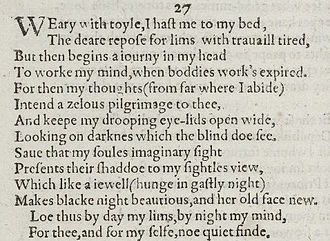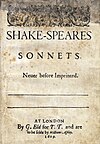Sonnet 27
| Sonnet 27 | |||||||
|---|---|---|---|---|---|---|---|
 Sonnet 27 in the 1609 Quarto | |||||||
| |||||||
Sonnet 27 is one of 154 sonnets written by the English playwright and poet William Shakespeare.
Structure
Sonnet 27 is an English or Shakespearean sonnet. The English sonnet consists of three quatrains followed by a couplet, having the rhyme scheme abab cdcd efef gg, and is written in iambic pentameter, a type of poetic metre based on five pairs of metrically weak/strong syllabic positions. Line thirteen exhibits a regular iambic pentameter:
× / × / × / × / × / Lo! thus, by day my limbs, by night my mind, (27.13)
- / = ictus, a metrically strong syllabic position. × = nonictus.
Analysis
Sonnet 27 is part of the Fair Youth sequence. It is the beginning of a series of five sonnets (27 to 31), that focuse on the solitary poet reflecting on his friend.[2] Sonnets 27 and 28, consider night and sleeplessness — traditional topics in Petrarchan sonnet sequences.
For another of Shakespeare's sonnets dealing with night, sleep, and dreams see Sonnet 43.
Notes
- ^ Shakespeare, William. Duncan-Jones, Katherine. Shakespeare’s Sonnets. Bloomsbury Arden 2010. p. 165 ISBN 9781408017975.
- ^ Shakespeare, William. Duncan-Jones, Katherine. Shakespeare’s Sonnets. Bloomsbury Arden 2010. p. 167 ISBN 9781408017975.
References
- Baldwin, T. W. (1950). On the Literary Genetics of Shakspeare's Sonnets. University of Illinois Press, Urbana.
- Hubler, Edwin (1952). The Sense of Shakespeare's Sonnets. Princeton University Press, Princeton.
- Schoenfeldt, Michael (2007). The Sonnets: The Cambridge Companion to Shakespeare's Poetry. Patrick Cheney, Cambridge University Press, Cambridge.
- First edition and facsimile
- Shakespeare, William (1609). Shake-speares Sonnets: Never Before Imprinted. London: Thomas Thorpe.
- Lee, Sidney, ed. (1905). Shakespeares Sonnets: Being a reproduction in facsimile of the first edition. Oxford: Clarendon Press. OCLC 458829162.
- Variorum editions
- Alden, Raymond Macdonald, ed. (1916). The Sonnets of Shakespeare. Boston: Houghton Mifflin Harcourt. OCLC 234756.
- Rollins, Hyder Edward, ed. (1944). A New Variorum Edition of Shakespeare: The Sonnets [2 Volumes]. Philadelphia: J. B. Lippincott & Co. OCLC 6028485. — Volume I and Volume II at the Internet Archive
- Modern critical editions
- Atkins, Carl D., ed. (2007). Shakespeare's Sonnets: With Three Hundred Years of Commentary. Madison: Fairleigh Dickinson University Press. ISBN 978-0-8386-4163-7. OCLC 86090499.
- Booth, Stephen, ed. (2000) [1st ed. 1977]. Shakespeare's Sonnets (Rev. ed.). New Haven: Yale Nota Bene. ISBN 0-300-01959-9. OCLC 2968040.
- Burrow, Colin, ed. (2002). The Complete Sonnets and Poems. The Oxford Shakespeare. Oxford: Oxford University Press. ISBN 978-0192819338. OCLC 48532938.
- Duncan-Jones, Katherine, ed. (2010) [1st ed. 1997]. Shakespeare's Sonnets. Arden Shakespeare, third series (Rev. ed.). London: Bloomsbury. ISBN 978-1-4080-1797-5. OCLC 755065951. — 1st edition at the Internet Archive
- Evans, G. Blakemore, ed. (1996). The Sonnets. The New Cambridge Shakespeare. Cambridge: Cambridge University Press. ISBN 978-0521294034. OCLC 32272082.
- Kerrigan, John, ed. (1995) [1st ed. 1986]. The Sonnets ; and, A Lover's Complaint. New Penguin Shakespeare (Rev. ed.). Penguin Books. ISBN 0-14-070732-8. OCLC 15018446.
- Mowat, Barbara A.; Werstine, Paul, eds. (2006). Shakespeare's Sonnets & Poems. Folger Shakespeare Library. New York: Washington Square Press. ISBN 978-0743273282. OCLC 64594469.
- Orgel, Stephen, ed. (2001). The Sonnets. The Pelican Shakespeare (Rev. ed.). New York: Penguin Books. ISBN 978-0140714531. OCLC 46683809.
- Vendler, Helen, ed. (1997). The Art of Shakespeare's Sonnets. Cambridge, Massachusetts: The Belknap Press of Harvard University Press. ISBN 0-674-63712-7. OCLC 36806589.
External links
 Works related to Sonnet 27 (Shakespeare) at Wikisource
Works related to Sonnet 27 (Shakespeare) at Wikisource- Paraphrase and analysis (Shakespeare-online)
- Analysis


